Reliance Retail – 7-Eleven Deal: On October 9, Reliance Retail will open the first 7-Eleven shop in Mumbai’s Andheri East neighbourhood.
Throughout the near future, the business aims to open many more outlets under the name in the Greater Mumbai cluster.
Reliance Retail, the retail arm of the oil-to-telecom giant Reliance Industries, announced intentions to open 7-Eleven stores in India on October 7.

The business plans to open the first store under the name in Andheri East, followed by a slew of others around the Greater Mumbai region.
The announcement by Reliance Retail to open 7-Eleven outlets in the country comes after the Future Group’s contract with the retail chain was terminated.
The Future Group, which owns Big Bazaar, Nilgiris, and Foodhall hypermarkets, signed a deal with 7-Eleven in 2019 to launch its shops in India, with the first one set to open in Mumbai in 2020.
However, the group’s deal with 7-Eleven was cancelled earlier this week, and this plan fell through.
The insolvent company is locked in a court dispute with e-commerce behemoth Amazon over its Reliance Retail agreement.
Last year, Reliance Retail paid Rs 24,713 crore for the retail divisions of Future Group.
According to Encyclopaedia Britannica, 7-Eleven began as an icehouse in 1927, selling block ice for food preservation to families without electric refrigerators.
The firm now has 77,000 shops in 18 countries across the world. According to experts, the opening of 7-Eleven shops may solidify Reliance Retail’s position in the food market.
Here’s all you need to know about the convenience store chain and its place in Reliance Retail’s Indian strategy.
The inception of the ‘world’s first convenience store’
According to the Dallas Southland Ice Company’s official website, John Jefferson Green and Joe C. ‘Jodie’ Thompson, one of the company’s five founding directors, got together to sell daily necessities including milk, eggs, and branded products at Thompson’s ice dock in Dallas, Texas.
According to the business, this was the genesis of the “world’s first convenience shop.”
After the ban on alcohol in the United States was abolished in 1933, they began selling fuel in 1928 and then beer and liquor in 1933.
In 1937, the couple began to grow their business by opening more locations and adding new product lines.
In 1946, the firm changed its name from Tote’m Stores to 7-Eleven and expanded its operating hours from 7 a.m. to 11 p.m., which was unheard of at the time.
Expansion beyond Texas, then the US
In the 1950s, 7-Eleven began extending outside Texas to other parts of the United States.
The business launched a store in Austin in 1963 that was open 24 hours a day, and several of its other locations quickly followed suit.
In 1969, the firm began international operations in Canada, and by the 1980s, it had expanded to include Australia, Sweden, Taiwan, Hong Kong, and Singapore, among others.
A US-based company with a Japanese owner
In 1973, 7-Eleven’s parent company, Southland Corp, entered a licence deal with Japanese department store giant Ito-Yokado to operate shops in Japan.
Other sectors in which the corporation has expanded include car parts, gasoline, and so on. In the late 1980s, it got deeply indebted, and it was compelled to sell the new enterprises.
Despite these efforts, the company went bankrupt in 1990. Its Japanese licensee then purchased 70% of the company’s equity and became the main shareholder.
The firm was renamed 7-Eleven Inc. in 1999. Seven & I Holdings acquired the firm in 2005 and made it a wholly-owned subsidiary.
The model of operation
7-Eleven offers company-owned and franchised convenience stores at airport terminals, railway stations, and other transportation hubs, as well as universities, malls, hotels, and stadiums across the world.
The typical size of its stores is 2,500-4000 square feet. Food and snacks, as well as soft beverages, groceries, confectioneries, over-the-counter medications, toiletries, newspapers, and other necessities, are all available at the store.
Several 7-Eleven shops in the United States are also gas stations. According to Statista, the firm has the most locations in Japan, with 20,988, followed by over 11,000 stores in Thailand and over 10,000 stores in South Korea as of 2020.
In 2020, there were around 9,364 7-Eleven stores in the United States.
The convenience store business is well-known for its on-the-go food and beverage options.
The firm claims to be the first to provide consumers on-the-go coffee.
Reliance Retail’s game plan for the chain
Reliance Retail, like 7-Eleven, intends to provide a variety of beverages, snacks, and delicacies tailored to the Indian palate, as well as everyday staples at low rates. Analysts believe that Reliance Retail’s deal with 7-Eleven will help to boost its grocery business.
According to Abneesh Roy, executive director of Edelweiss Securities, the deal between the two businesses has numerous advantages because many urban customers in India are already familiar with the brand, and 7-Eleven would provide Reliance Retail with a distinct variety and global scale.
He also hinted that Reliance Retail may employ 7-Eleven outlets as part of its omnichannel strategy.
| Press-Wire Homepage | press-wire.org |
